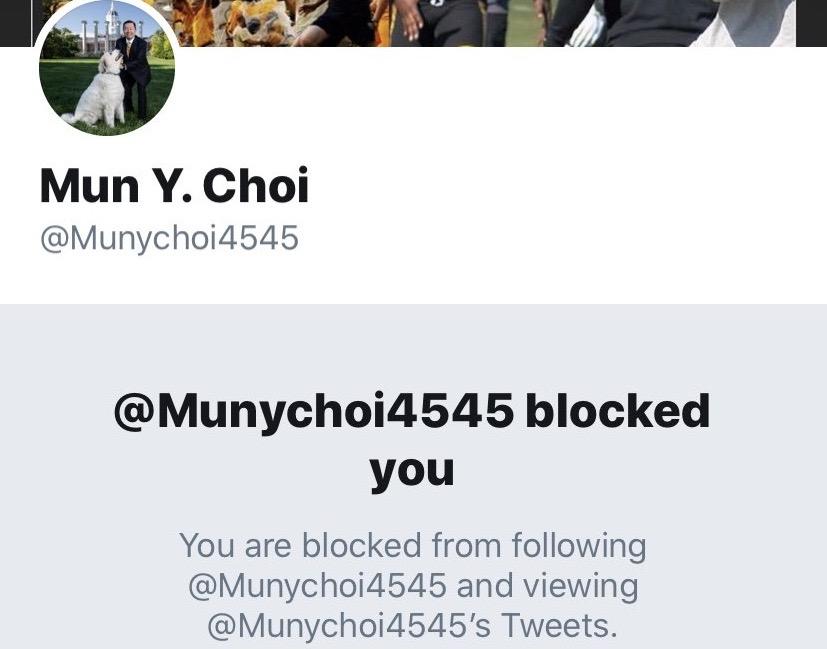Following a Sunshine Law records request and the threat of a lawsuit, UM System President and MU Chancellor Mun Choi has unblocked students on Twitter, MU spokesperson Christian Basi said.
Basi said Choi blocked the accounts because the tweets in question contained profanity and hateful speech directed at Choi.
“The tweets did not provide valid feedback or good criticism of the university and that is why (Choi) took the initial action,” Basi said. “He reversed those actions because he did not want this to remain a distraction for the university and he is really trying to focus on moving us forward.”
Basi said Choi is generally responsive to critical comments.
“Choi regularly responds to criticism,” Basi said. “This was a very rarely used Twitter account, so it is not used regularly and it is certainly not used by the university for official social media activity.”
Basi went on to stress that Choi’s personal actions on his “private” account do not reflect how the university handles feedback.
Choi’s titles of UM System President and MU Chancellor are both listed on his Twitter account, and there is no other account associated with either position.
###Original Story###
UM System President and MU Chancellor Mun Choi could face legal action after blocking students on Twitter who voiced concerns over MU’s handling of the COVID-19 pandemic on his Twitter account, @munychoi4545.
In a letter sent to Choi, the Board of Curators and the Office of the General Counsel, lawyer Christopher Bennett asked Choi to “immediately unblock each person he has blocked on Twitter” or face legal action in the U.S. District Court, alleging he violated the First Amendment by preventing students from seeing or interacting with his tweets.
“The kind of conversations that can occur in replies become its own little form of a government forum,” Bennett said. “And so when you block someone, you deny them access to that forum, because they can’t see your feed and cannot engage with the replies to them.”
Bennett was concerned about the First Amendment implications of Choi’s actions after discovering them on Twitter, and volunteered to work on the case for free.
“He didn’t even have to address what he said, but he just wouldn’t even bear to look at it and decided he needed to block that content instead,” Bennett said.
President Donald Trump faced a similar lawsuit in May 2018, when a federal judge in New York City ruled the president could not block users on his personal Twitter account, @RealDonaldTrump, without violating the U.S. Constitution. The judge said Trump’s Twitter account was a “designated public forum” and individuals with differing political views could not be blocked from seeing and interacting with his tweets.
There is still no exact reported number of blocked students. The Maneater has filed a Sunshine Law public records request for a list of the Twitter accounts blocked by Choi.
The administration’s response to students’ calls for COVID-19 reforms has left some doubting the administration’s leadership overall.
Michael D. Olson, a history PhD student, has multiple tweets listing his displeasure with how the school has handled the pandemic. With his account blocked, he cannot help but question the leadership even more. He now fears the school is trying to “save face” instead of saving the overall health of the campus.
“The fact that the chancellor of the university is spending time out of his day searching for students to block because he can’t stand criticism is disgusting,” Olson said.
MU student Cannon Summers tweeted about the bathroom sinks on campus not working and the implication on the school’s personal hygiene policies. He was blocked moments later.
“Mizzou has done nothing but try to silence the voices of student concern and won’t acknowledge any accountability,” Summers said.
Summers has connected with other students affected by the blocking through Twitter feeds who also share his need for a campus built on “transparency.”
“I feel absolutely betrayed,” Summers said. “The Mizzou I applied for was a school who welcomed different opinions and encouraged [journalistic accountability.]”
_Edited by Lucy Caile | [email protected]_














